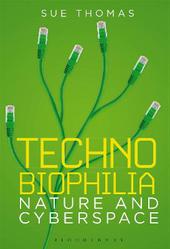
|
Technobiophilia: Nature and Cyberspace
Hardback
Main Details
| Title |
Technobiophilia: Nature and Cyberspace
|
| Authors and Contributors |
By (author) Sue Thomas
|
| Physical Properties |
| Format:Hardback | | Pages:272 | | Dimensions(mm): Height 234,Width 156 |
|
| ISBN/Barcode |
9781849660419
|
| Classifications | Dewey:302.231014 |
|---|
| Audience | | Undergraduate | | Postgraduate, Research & Scholarly | |
|---|
|
Publishing Details |
| Publisher |
Bloomsbury Publishing PLC
|
| Imprint |
Bloomsbury Academic
|
| Publication Date |
26 September 2013 |
| Publication Country |
United Kingdom
|
Description
Why are there so many nature metaphors - clouds, rivers, streams, viruses, and bugs - in the language of the internet? Why do we adorn our screens with exotic images of forests, waterfalls, animals and beaches? In Technobiophilia: Nature and Cyberspace, Sue Thomas interrogates the prevalence online of nature-derived metaphors and imagery and comes to a surprising conclusion. The root of this trend, she believes, lies in biophilia, defined by biologist E.O. Wilson as 'the innate attraction to life and lifelike processes'. In this wide-ranging transdisciplinary study she explores the strong thread of biophilia which runs through our online lives, a phenomenon she calls 'technobiophilia', or, the 'innate attraction to life and lifelike processes as they appear in technology'. The restorative qualities of biophilia can alleviate mental fatigue and enhance our capacity for directed attention, soothing our connected minds and easing our relationship with computers. Technobiophilia: Nature and Cyberspace offers new insights on what is commonly known as 'work-life balance'. It explores ways to make our peace with technology-induced anxiety and achieve a 'tech-nature balance' through practical experiments designed to enhance our digital lives indoors, outdoors, and online. The book draws on a long history of literature on nature and technology and breaks new ground as the first to link the two. Its accessible style will attract the general reader, whilst the clear definition of key terms and concepts throughout should appeal to undergraduates and postgraduates of new media and communication studies, internet studies, environmental psychology, and human-computer interaction. www.technobiophilia.com
Author Biography
Sue Thomas is an independent researcher and digital pioneer. In 1995 she founded the trAce Online Writing Centre, an early global online community which ran for ten years. From 2005-2013 she was Professor of New Media in the Institute of Creative Technologies at De Montfort University, UK, where she researched social media, transliteracy, transdisciplinarity and future foresight. She's currently a Visiting Fellow in The Media School at Bournemouth University, UK. Her previous books include Correspondence (1992), short-listed for the Arthur C. Clarke Award for Best Science Fiction Novel, and Hello World: travels in virtuality (2004), a travelogue/ memoir of life online. She lives in Bournemouth, Dorset, UK.
ReviewsSue Thomas has taken a very personal and broadly interdisciplinary look at one of the most important issues of our time -- the tension between the natural and digital worlds. This book provides a useful lens for seeing where we are, who we are, and where humans, our digital creations, and the natural world are heading. We need to learn to make fulfilling lives without abandoning either the world of technology or the world of biology. Technobiophlia shows the way. -- Howard Rheingold, Lecturer, Stanford University, US, and author of Net Smart At a time when our technological environment has become so intricate, omnipresent and autonomous that we have started to perceive it as a nature of its own, such sensibilities are desperately needed. -- Koert van Mensvoort, author of Next Nature: Nature Changes Along with Us The book is about a powerful subliminal urge by our entire species to hang onto our connection to the natural world, as we are pulled deeper into the digital age...It is good to find someone like Thomas who loves nature but is not an anti-technologist. Her book is the beginning of a line of thinking that needs to be expanded by those who are deeply concerned about the effects of our addiction to technology. The book reinforces the idea that if human problems are exacerbated by technology, as they certainly are, doesn't it make sense to use technology to ameliorate human problems...Thomas book is filled with well-documented, transdisciplinary, theoretical arguments for the many researchers who should begin working in this field;, but it is a good read for general audiences...I kept reading because I want to see where the personal story leads. What happens to her suggest some things that we ought to make happen for ourselves far more often than we do. -- George Davis * PsychologyToday.com *
|